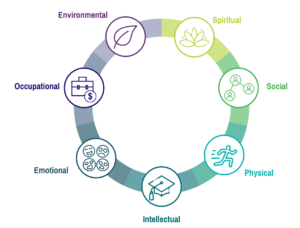Menu
Close
Understanding The Wellness Wheel
Jan 13, 2021
Wellness is about modifying areas of your life that will lead to healthier physical, emotional, and spiritual outcomes. Developing and practicing these changes looks and feels different for everyone. Finding wellness is about discovering what is best for you.
To fully understand the significance of wellness, let’s break down the Wellness Wheel — an interconnected wheel that shows 7 different areas that impact your well being. Neglecting areas of the wheel will affect your wellness, keeping you imbalanced and potentially affecting your mental health.
The Wellness Wheel

Areas of Wellness

The essence of spirituality is about discovering a sense of purpose and meaning within your life. Defining Spirituality Wellness is different for everyone and can based on factors including:
- Faith
- Beliefs
- Ethics
- Morals
- Principles
- Values
Spiritual wellbeing allows people to discover how to achieve calmness and peace in times of tribulation. Spirituality can be practiced through grounded exercises.

Having positive and supportive connections with family, friends, teachers, classmates, teammates, coaches, etc., is defined as Social Wellness. Engaging with those around you helps build communicative skills while developing trustworthy and healthy relationships. Whether you’re on a sports team or in an online community, human beings are social creatures that need to connect to one another. Some signs of social well-being include:
- Engaging With Your Community
- Valuing Diversity
- Reaching Out For Support
- Building Necessary Boundaries
- Creating A Safe Inner Circle
- Being An Active Listener

Physical Wellness is the act of listening to your physique and as a response, taking care of your body for optimal health. Maintaining your physical health and wellness factors in:
- Regular Exercise
- Balanced Nutrition
- Sleep Patterns
- Safe Sexual Health
- Illness Prevention
- Stress Management
Adopting all of these elements into your daily life not only optimizes your physical health, but your mental health.

Critical thinking, creative thinking and being open to new ideas and ideologies are ways to embrace Intellectual Wellness. Being intellectual can be described as developing skills to train your brain such as:
- Constantly Observing
- Studying New Material
- Getting Out Of Your Comfort Zone
- Time Management
Understanding and acknowledging different beliefs and values that others believe in is a significant way to unobjectively boost and maintain your intellect.

Emotional Wellness focuses on thoughts, feelings, the ability to have an optimistic view on life and how to express and process emotions. When negative emotions arise, it is important that you have an outlet to express them in a safe way. This can include:
- Talking To A Trusted Adult
- Journaling
- Listening To Music
- Counselling
- Exercising
- Self-Care
Although being optimistic can be challenging during difficult times, immersing yourself in conversation or a certain activity can reverse those feelings and bring you back to a regular state of emotional wellness.

- Financial Security
- Collaborating With Like-Minded People
- Understanding Work or School/Life Balance
- Feeling Challenged/Motivated
- Feeling Inspired
- Achieving Career Goals
If your occupation or educational journey is not matching up with your wellbeing, consider looking for other opportunities that spark a certain drive that you are currently lacking.

Spending your time in a safe and clean environment can help promote Environmental Wellness. You can find these types of outdoor spaces in your local parks or by creating them at home with natural lighting and plants. Contributing to the well-being of the environment makes people respect, and feel more appreciative about their surroundings. Environmentally-friendly acts you can start practicing today include:
- Riding a Bike
- Reduce, Reuse, Recycle
- Compost Food
- Use Natural Products
- Take Advantage of Sunlight
- Resist Littering
- Spend More Time Outside
By understanding each spoke of the Wellness Wheel, you can self-identify which areas you need to focus on to fulfill that type of wellness. If you or someone you know is struggling at this time, please direct them to CMHA Calgary’s Peer Support.

If you cannot find someone you trust who is willing to support you, dial a crisis line right away at 403-266-HELP (4357) All crisis lines are confidential.

YouthSMART would like to thank Sagium and Kinsted Wealth for being our 2020 – 2021 website sponsor.
